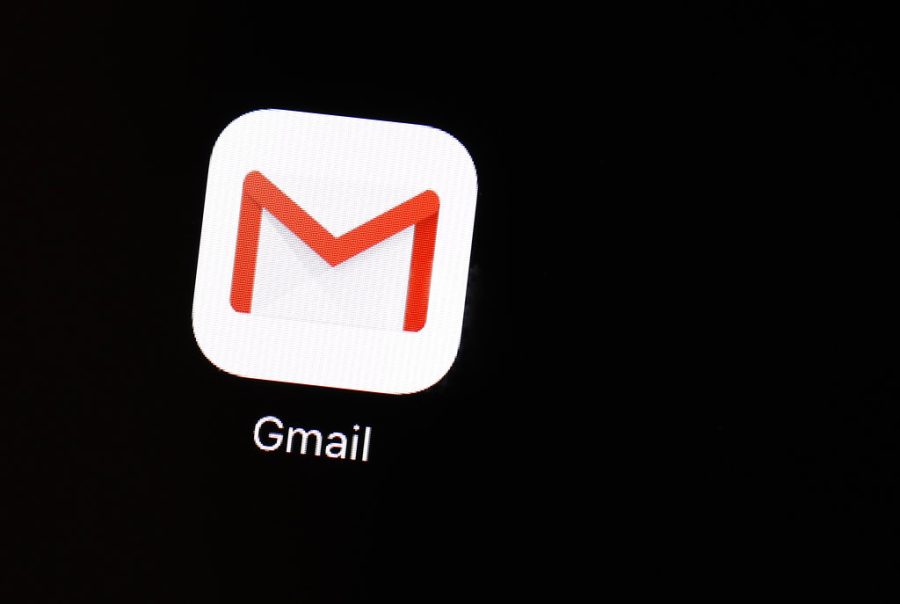Hunter Moore exposes vulnerability in our Gmail accounts
Students, it never hurts to remember that the internet will never forget
AP
Gmail, with about 1.8 billion users worldwide, proved just as susceptible to hacking from Hunter Moore’s victims. (AP Photo/Patrick Semansky)
Remember that picture of your credit card you emailed to yourself three years ago? For most people, the answer would probably be no. But while that grainy little picture escaped our minds a long while ago, The Internet has a mind of infinite space. “The internet never forgets,” they always say. This phrase has been so hackneyed that we like to think it’s tattooed in our brains. But is it really?
On July 27, Netflix released a new docuseries called “The Most Hated Man on the Internet” featuring Hunter Moore, a man who hacked into the Gmail accounts of many victims to steal their nude photos and post them on his website: isanyoneup.com.
Hacking is usually perceived as using complicated loopholes like the dark-web to find what makes something vulnerable. But what’s interesting is how Moore, dubbed “The Most Hated Man on the Internet,” managed to catch his victims unawares in one of the most unsuspecting of databases: Gmail.
It all began when hacker Charlie Evens hacked into Moore’s email account. Moore, still collecting compromising pictures to build his website, decided to hire Evens to get photos from other people’s accounts whom he hacked into. “I’ll pay you $200 a week,” Moore wrote in an email to Evens on Oct. 15, 2011.
Victims would get temporarily locked out of their email account. During that time, Evens would instill a secondary email account: [email protected]. Under the alias of Gary Jones, Evens would hack into accounts and steal pictures for Moore. He would then receive payment via an anonymous PayPal account.
The mother of one of the victims, Charlotte Laws, managed to work with the FBI and The Village Voice, a news weekly in New York City, to gather enough evidence of hacking to arrest both Moore and Evens on Jan. 24, 2014. Moore was sentenced to two years and six months in prison, and Evens was charged with 25 months in prison.
Moore was one of the most notorious bullies on the internet, ruining the lives of many people, especially women, on his platform. From Buffalo, New York, Cara, her last name unconfirmed in the docuseries, was one of Moore’s victims. The comments from her photos left her spiraling in self-worth, and attempting suicide by overdosing on prescription pills. Her roommate managed to find Cara’s cat scratching at her door, and was able to get Cara to the hospital before it was too late.
That same year, James McGibney, a web entrepreneur, was approached by Moore in hopes of advertising McGibney’s work on isanyoneup.com. When McGibney opened Moore’s website isanyoneup.com, he was appalled. McGibney set his sights on shutting it down.
McGibney pretended to befriend Moore in order to persuade him to sell isanyoneup.com for $15,000. McGibney redirected isanyoneup.com to his website bullyville.com, an anti-bully site for people to listen to celebrities share their experiences with bullying, allowing for help and healing.
Once Moore found out about this, he began angrily tweeting about McGibney being a pedophile, and threatened to sexually assault McGibney’s wife. McGibney, a victim of child abuse from his father, considered this act the last straw, and worked with Charlotte Laws to put Moore behind bars.
It seems like a happy ending, with one of the most notorious cyberbullies brought to justice– but the reality is that this is simply one man down. There are many more bullies out there; we just need to spot them before they spot us. What Moore and Evens showed the world is how Gmail truly does not forget.
Especially in the case of high schoolers, as we live and breathe Gmail in our day to day lives, it is very easy to become an unsuspecting victim. With so much trust built into this platform, a small glitch in the system is often overlooked.
“The internet never forgets.” We all know this from the countless lectures from the time we first got a phone to the first time we set up our iPads for high school. It is always good to know to stay vigilant on the internet, but it is even more important to never stop staying vigilant. Especially on Gmail.








































